

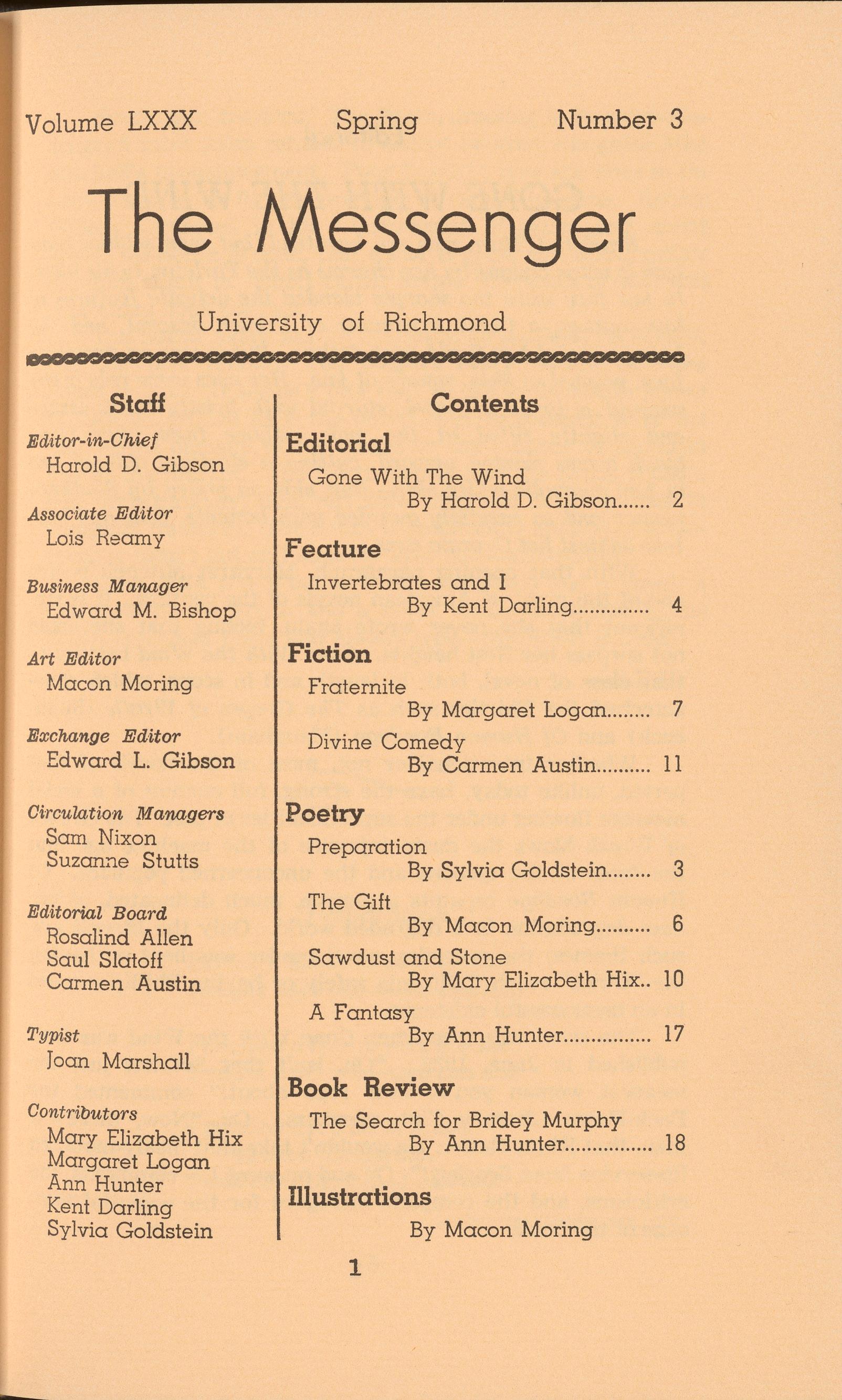




Editor-in-Chief
Harold D. Gibson
Associate Editor
Lois Reamy
Business Manager
Edward M. Bishop
Art Editor
Macon Moring
Exchange Editor
Edward L. Gibson
Oirculation Managers
Sam Nixon
Suzanne Stutts
Editorial Board
Rosalind Allen
Saul Slatoff
Carmen Austin
Typist
Joan Marshall
Oontributors
Mary Elizabeth Hix
Margaret
Ann Hunter
Kent Darling
Sylvia Goldstein
Scar7,ett O'Hara was not beautiful, but men seldom realized it when caught by her charms as the Tarleton twins were. In her face were too sharply blended the delicate features of her mother, a Coast aristocrat of French descent, and the heavy ones of her florid Irish father. Bitt it was an arresting face, pointed of chin, square of jaw. Her eyes were pale green without a touch of hazel, starred with bristly black lashes and slightly tilted at the ends. Above them, her thick black brows slanted upward, cutting a startling oblique line in her magnolia-white skin-that skin so prized by Southern women and so carefully guarded with bonnets, veils and mjttens against hot Georgia suns.
With that opening paragraph, Margaret Mitchell begins one of the greatest American novels of the century. It is significant that she never wrote again, feeling that she could not surpass her first heights. Gone With the Wind belongs to that class of novel, both in length and in scope, which characterized the Thirties such as The Grapes of Wrath (Steinbeck) and Of Human Bondage (Maugham).
Whether intentional or not, most of the novels of that period, unlike today, have the strong, full current of a social message flowing under the superficialities of plot. The Grapes of Wrath blows the dusty injustice of the machine age into the faces of the tycoons and the unconcerned populace. Of Human Bondage repaints a picture, much delineated, of hu• man degradation in a degraded world. Only the literati saw such themes; the everyday novel reader was bent on having the "Okies" reach California safely or having Phillip succeed in an unsuccessful existence.
The same was true when Gone With the Wind was first published in June, 1936. "Oh, isn't that Scarlett just the meanest woman you've ever read about!" commented the Back-Fence Literary Club members. Or, "Now, there's a man, that Rhett Butler. He wouldn't take that mealy-mouthed lip-service from Scarlett!" On and on went the comments, the criticisms, and the complete disregard for the essential message of the book.
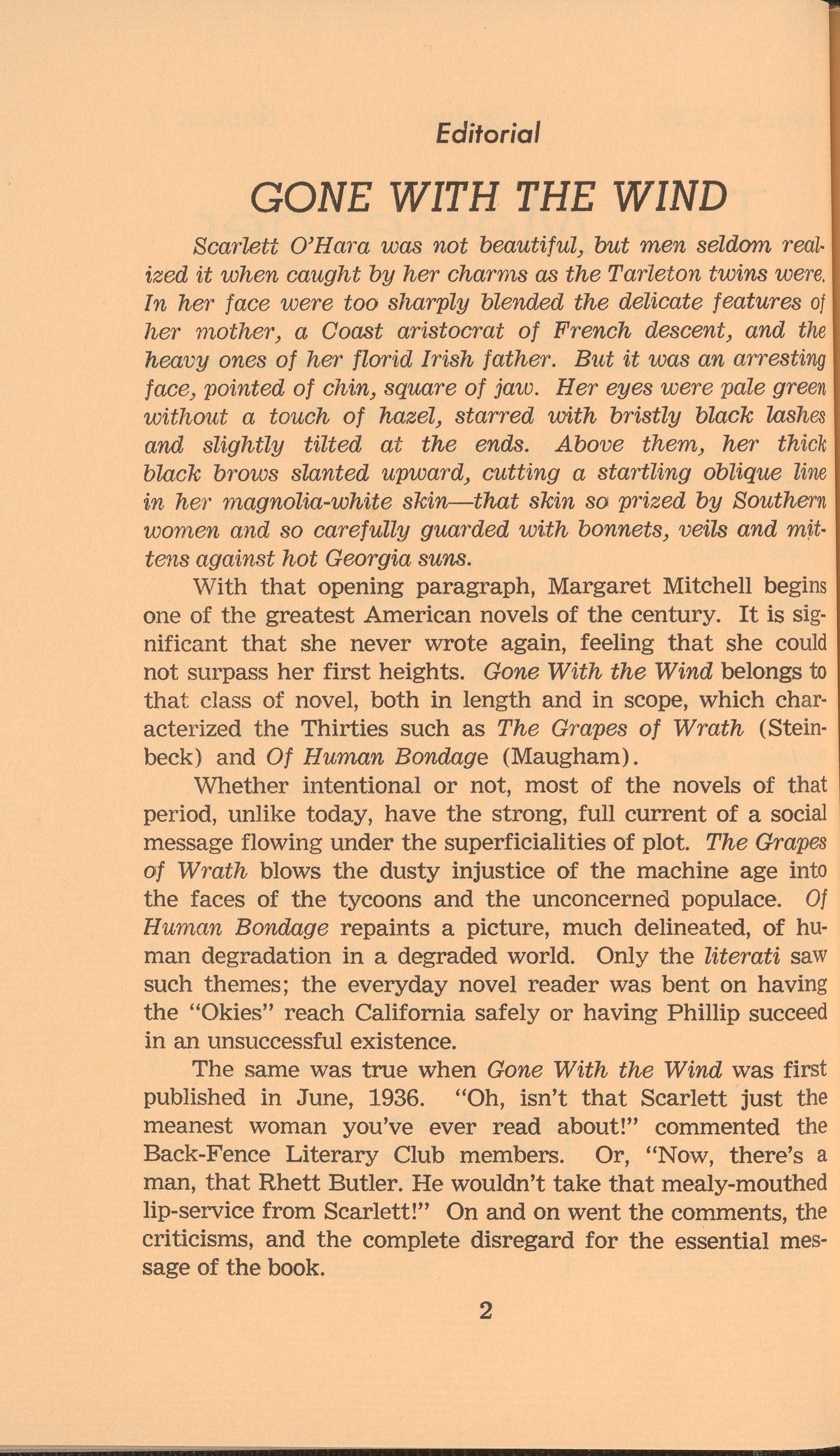
South, you are dead! The South, drooling in its magnoliadrugged mint julep refuses to accept or even recognize Miss Mitchell's pronouncement. Poor Scarlett, how she tries to restore Tara to its former prestige; it cannot be done. Ashley Wilkes, protected in his dream-world of books and music knows his South is dead, that honor is gone, and would rather die than admit it. Rhett Butler knows the South is dead and capitalizes upon the fact.
The South today has its Scarletts, its Ashleys, its Rhetts, but the fact remains and plagues every Southerner-the South is dead. It seems a pity that no one in the South knows it. All go around as if the only things to consider were the boll weevil damage to the cotton or the number of slaves to buy at the market. The North knows that the South is dead, but, unfortunately, does not know that the South refuses to recognize its death. The South is desperately holding to something it hasn't got and scarcely ever had-aristocracy.
Gooe With the Wind is both a diagnosis and a novel: a diagnosis of the South and a novel whose revelation to the South is alwa¥s there and alwws true-the South is dead.
-H.D.G.
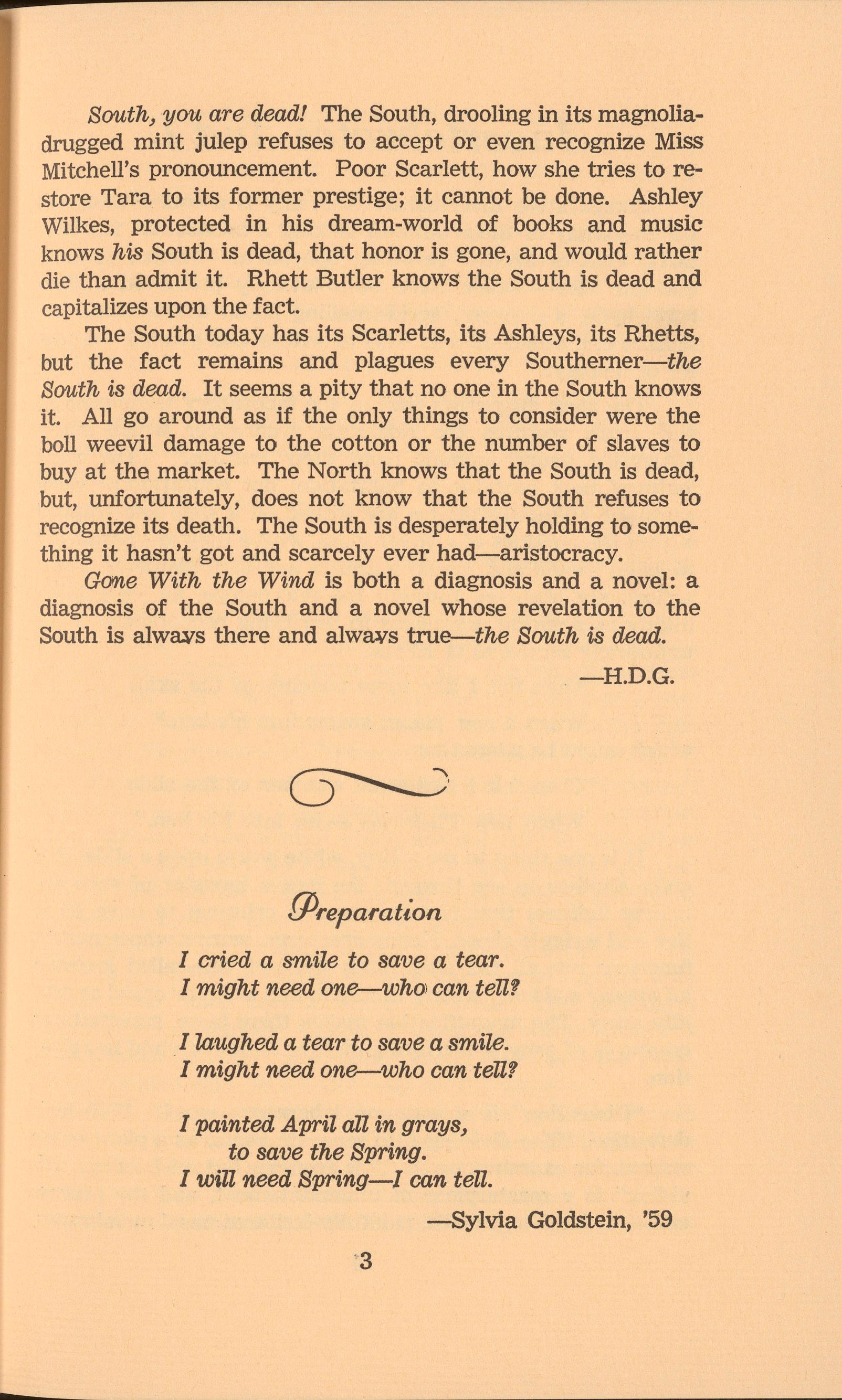
I cried a smile to save a tear. I might need one-whoi can tell?
I laughed a tear to save a smile. I might need one-who can tell?
I painted April all in grays, to save the Spring. I will need Spring-I can tell.
-Sylvia Goldstein, '59
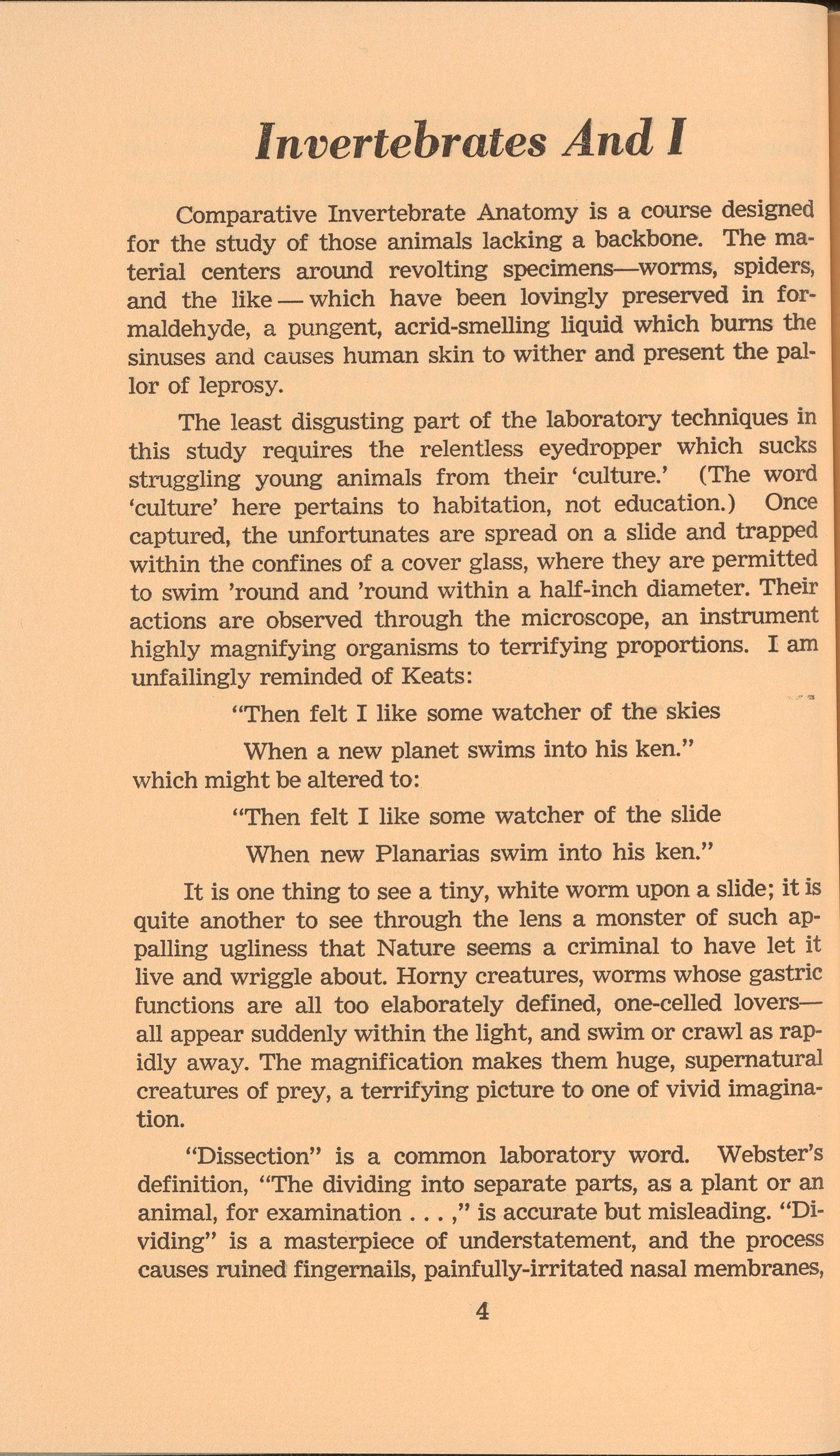
Comparative Invertebrate Anatomy is a course designed for the study of those animals lacking a backbone. The material centers around revolting specimens-worms, spiders, and the like -which have been lovingly preserved in formaldehyde, a pungent, acrid-smelling liquid which burns the sinuses and causes human skin to wither and present the pallor of leprosy.
The least disgusting part of the laboratory techniques in this study requires the relentless eyedropper which sucks struggling young animals from their 'culture.' (The word 'culture' here pertains to habitation, not education.) Once captured, the unfortunates are spread on a slide and trapped within the confines of a cover glass, where they are permitted to swim 'round and 'round within a half-inch diameter. Their actions are observed through the microscope, an instrument highly magnifying organisms to terrifying proportions. I am unfailingly reminded of Keats:
"Then felt I like some watcher of the skies
When a new planet swims into his ken." which might be altered to:
"Then felt I like some watcher of the slide
When new Planarias swim into his ken."
It is one thing to see a tiny, white worm upon a slide; it is quite another to see through the lens a monster of such appalling ugliness that Nature seems a criminal to have let it live and wriggle about. Horny creatures, worms whose gastric functions are all too elaborately defined, one-celled loversall appear suddenly within the light, and swim or crawl as rapidly away. The magnification makes them huge, supernatural creatures of prey, a terrifying picture to one of vivid imagination.
"Dissection" is a common laboratory word. Webster's definition, "The dividing into separate parts, as a plant or an animal, for examination ... ," is accurate but misleading. "Dividing" is a masterpiece of understatement, and the process causes ruined fingernails, painfully-irritated nasal membranes, 4
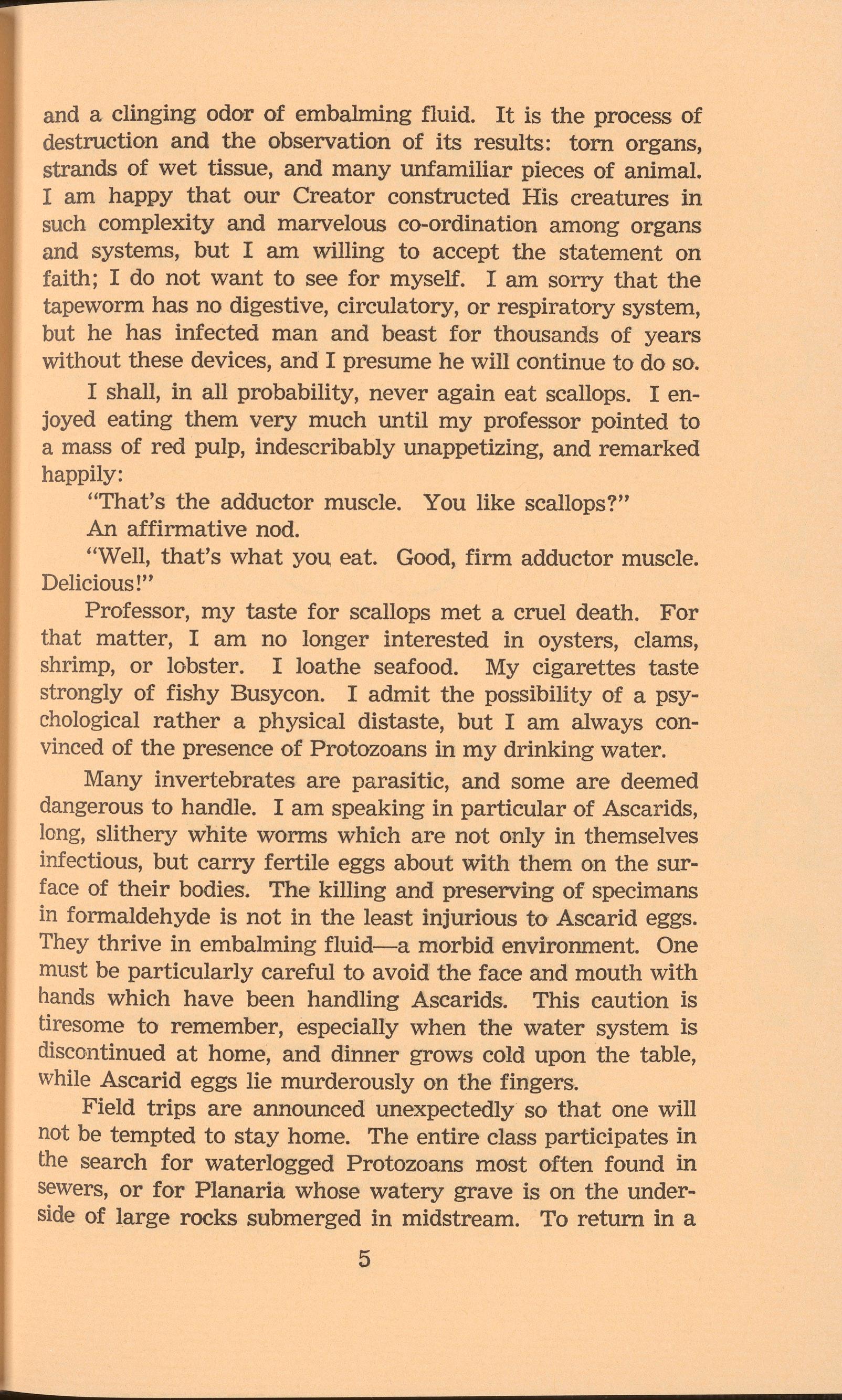
and a clinging odor of embalming fluid. It is the process of destruction and the observation of its results: torn organs, strands of wet tissue, and many unfamiliar pieces of animal. I am happy that our Creator constructed His creatures in such complexity and marvelous co-ordination among organs and systems, but I am willing to accept the statement on faith; I do not want to see for myself. I am sorry that the tapeworm has no digestive, circulatory, or respiratory system, but he has infected man and beast for thousands of years without these devices, and I presume he will continue to do so.
I shall, in all probability, never again eat scallops. I enjoyed eating them very much until my professor pointed to a mass of red pulp, indescribably unappetizing, and remarked happily:
"That's the adductor muscle. You like scallops?"
An affirmative nod.
"Well, that's what you eat. Good, firm adductor muscle. Delicious!"
Professor, my taste for scallops met a cruel death. For that matter, I am no longer interested in oysters, clams, shrimp, or lobster. I loathe seafood. My cigarettes taste strongly of fishy Busycon. I admit the possibility of a psychological rather a physical distaste, but I am always convinced of the presence of Protozoans in my drinking water.
Many invertebrates are parasitic, and some are deemed dangerous to handle. I am speaking in particular of Ascarids, long, slithery white worms which are not only in themselves infectious, but carry fertile eggs about with them on the surface of their bodies. The killing and preserving of specimans in formaldehyde is not in the least injurious to Ascarid eggs. They thrive in embalming fluid-a morbid environment. One must be particularly careful to avoid the face and mouth with hands which have been handling Ascarids. This caution is tiresome to remember, especially when the water system is discontinued at home, and dinner grows cold upon the table, while Ascarid eggs lie murderously on the fingers.
Field trips are announced unexpectedly so that one will not be tempted to stay home. The entire class participates in the search for waterlogged Protozoans most often found in sewers, or for Planaria whose watery grave is on the underside of large rocks submerged in midstream. To return in a
dry condition is a major achievement, and I have never seen it done. I have ruined two skirts and a pair of loafers by judging inaccurately leaps from rock to rock, and I have yet to present a specimen not in some way impaired and so rendered useless. The homeward trek is marked by laughter at my customary disreputable condition; it is unappreciated mirth.
Having adopted such a questionable attitude, is is not unfortunate that I am a Biology major?
-Kent Darling, '57
Ed. Note: Miss Darling is now an English major.
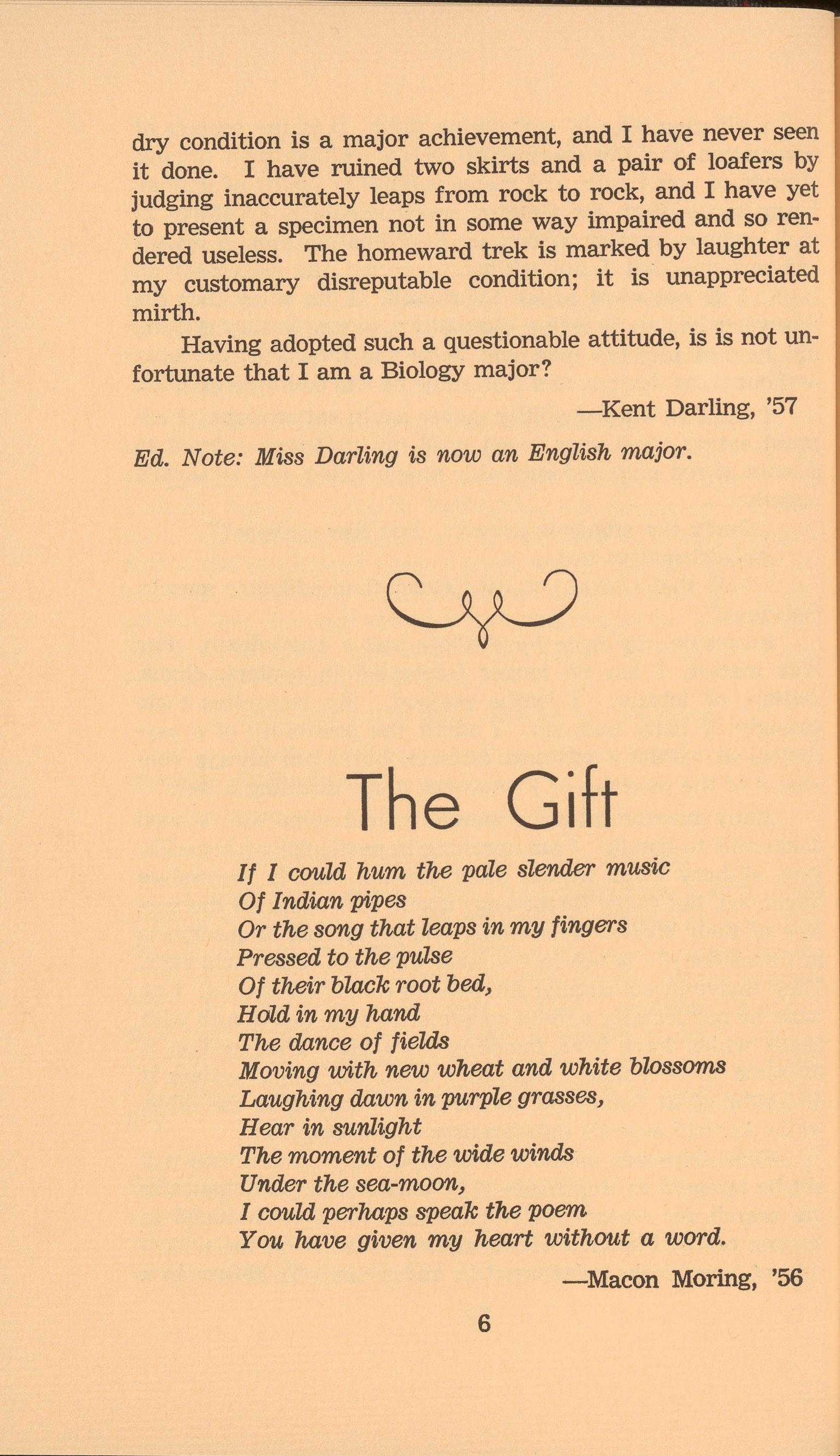
If I could hum the pale slender music
Of Indian pipes
Or the song that leaps in my fingers
Pressed to the pulse
Of their black root bed,
Hold in my hand
The dance of fieuls
Moving with new wheat and white blossoms
Laughing dawn in purple grasses,
Hear in sunlight
The moment of the wide winds
Under the sea-moon,
I could perhaps speak the poem
You have given my heart without a word.
-Macon Moring, '56

My mother and I have never been very close, if you know what I mean. With my father it's a little different - he descends to my level and we often have very pleasant talks together about things ·which would bore my mother. So when George asked me to this party, this wonderfully Bohemian party, I didn't even try to communicate my excitement to her -she wouldn't have been interested, and the disinterest would result in misunderstanding, and it wouldn't be worth it. So I dressed as usual, and didn't even tell her where I was going, except that I'd be late. Ordinarily I wouldn't have even said that, but it seemed to help a little, to compensate.
Maybe I better explain a little about this party. George lives in Bronxville and he's quite used to it all. That's why he asks me to these things-he's always saying he enjoys my reactions more than his own. It's incomprehensible, almost, the way he lives - the whole thing is totally out of my sphere. My father says it's a good thing I realize this, and that I'm not trying to be something alien to me. So I go as an observer, just like you'd read a Tennessee Williams play, living the thing vicariously, enjoying it for what it is, but not forgetting that you live in Stuyvesant Town and that you are a secretary, and that Monday morning you will be Miss Clark again. Of course you are changed, all the time, but it isn't something obvious to the other secretaries at lunch hour.
We got there rather late, and it was just as I had expected-girls in bare, slim dresses with not especially clean hair hanging very long or cropped so short they looked like small, intent boys. I sat down somewhere away from them all, but so I could see the whole composition of the party. George gave me a drink, and no one minded that I sat there quietly
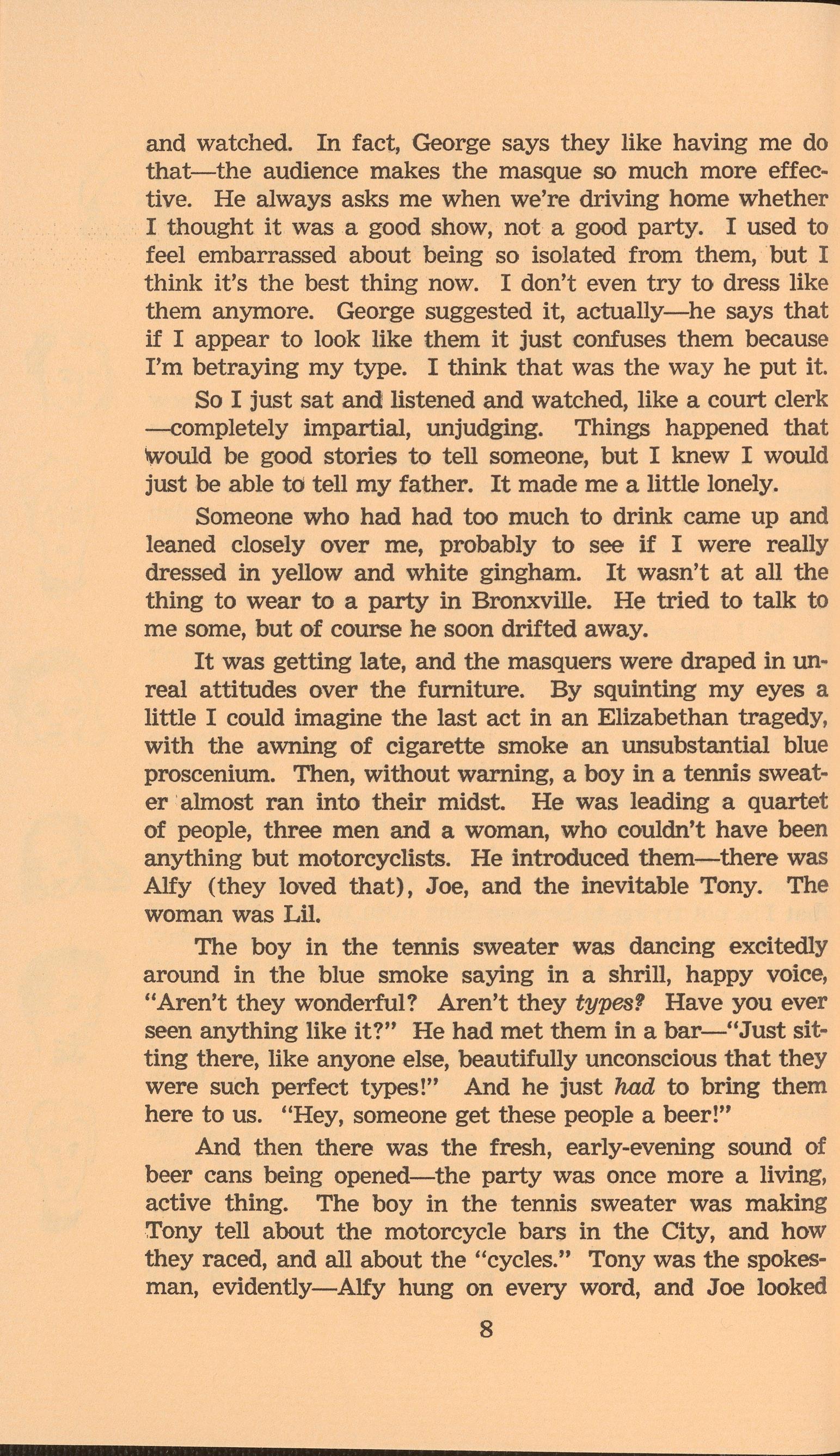
and watched. In fact, George says they like having me do that-the audience makes the masque so much more effective. He always asks me when we're driving home whether I thought it was a good show, not a good party. I used to feel embarrassed about being so isolated from them, but I think it's the best thing now. I don't even try to dress like them anymore. George suggested it, actually-he says that if I appear to look like them it just confuses them because I'm betraying my type. I think that was the way he put it.
So I just sat and listened and watched, like a court clerk -completely impartial, unjudging. Things happened that would be good stories to tell someone, but I knew I would just be able to tell my father. It made me a little lonely. Someone who had had too much to drink came up and leaned closely over me, probably to see if I were really dressed in yellow and white gingham. It wasn't at all the thing to wear to a party in Bronxville. He tried to talk to me some, but of course he soon drifted away.
It was getting late, and the masquers were draped in unreal attitudes over the furniture. By squinting my eyes a little I could imagine the last act in an Elizabethan tragedy, with the awning of cigarette smoke an unsubstantial blue proscenium. Then, without warning, a boy in a tennis sweater ·almost ran into their midst. He was leading a quartet of people, three men and a woman, who couldn't have been anything but motorcyclists. He introduced them-there was Alfy (they loved that), Joe, and the inevitable Tony. The woman was Lil.
The boy in the tennis sweater was dancing excitedly around in the blue smoke saying in a shrill, happy voice, "Aren't they wonderful? Aren't they types? Have you ever seen anything like it?" He had met them in a bar-"Just sitting there, like anyone else, beautifully unconscious that they were such perfect types!" And he just ha,d, to bring them here to us. "Hey, someone get these people a beer!"
And then there was the fresh, early-evening sound of beer cans being opened-the party was once more a living, active thing.
The boy in the tennis sweater was making Tony tell about the motorcycle bars in the City, and how they raced, and all about the "cycles." Tony was the spokesman, evidently-Alfy hung on every word, and Joe looked
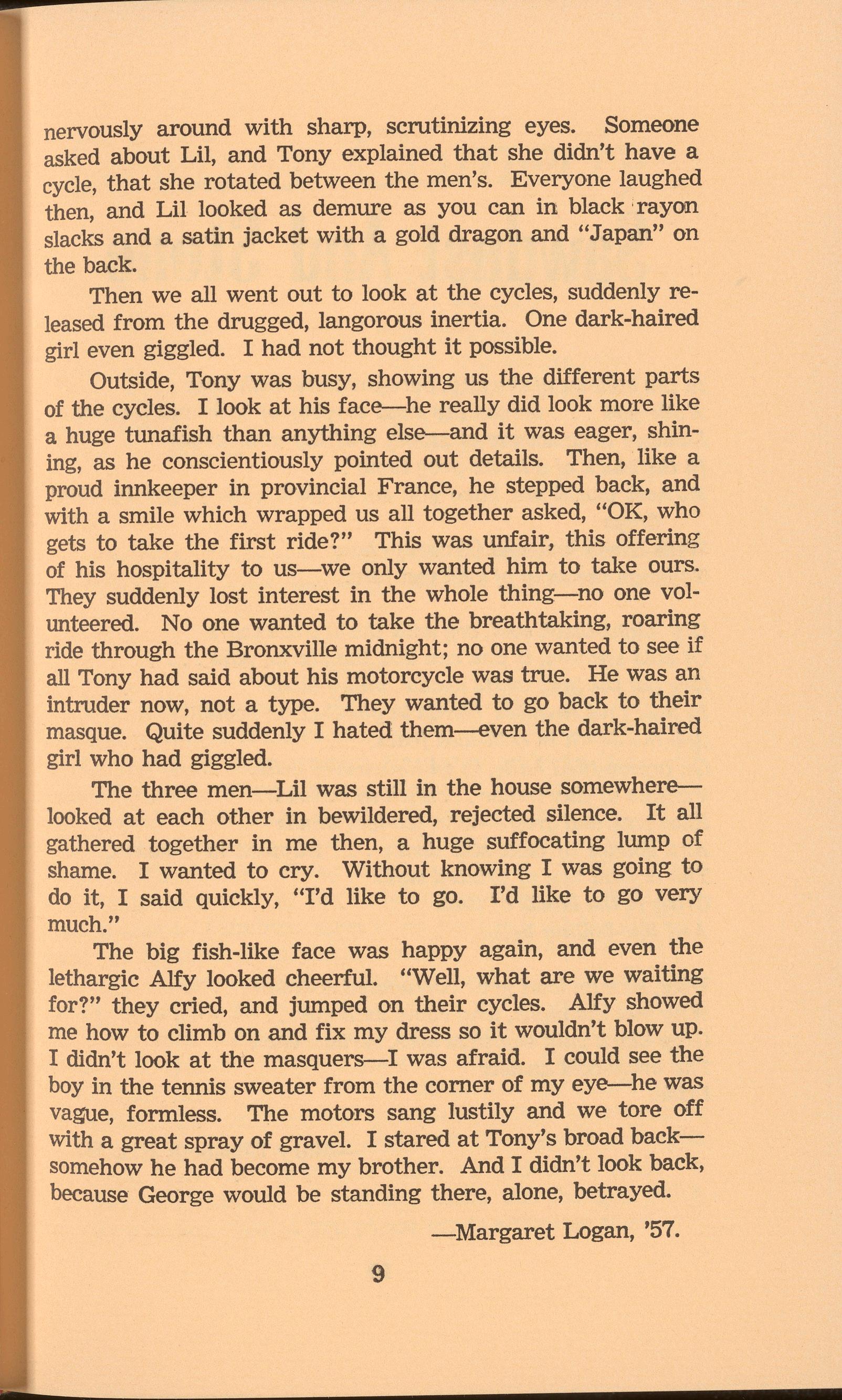
nervously around with sharp, scrutinizing eyes. Someone asked about Lil, and Tony explained that she didn't have a cycle, that she rotated between the men's. Everyone laughed then, and Lil looked as demure as you can in black ·rayon slacks and a satin jacket with a gold dragon and "Japan" on the back.
Then we all went out to look at the cycles, suddenly released from the drugged, langorous inertia. One dark-haired girl even giggled. I had not thought it possible.
Outside, Tony was busy, showing us the different parts of the cycles. I look at his face-he really did look more like a huge tunafish than anything else-and it was eager, shining, as he conscientiously pointed out details. Then, like a proud innkeeper in provincial France, he stepped back, and with a smile which wrapped us all together asked, "OK, who gets to take the first ride?" This was unfair, this offering of his hospitality to us-we only wanted him to take ours. They suddenly lost interest in the whole thing-no one volunteered. No one wanted to take the breathtaking, roaring ride through the Bronxville midnight; no one wanted to see if all Tony had said about his motorcycle was true. He was an intruder now, not a type. They wanted to go back to their masque. Quite suddenly I hated them-even the dark-haired girl who had giggled.
The three men-Lil was still in the house somewhere-looked at each other in bewildered, rejected silence. It all gathered together in me then, a huge suffocating lump of shame. I wanted to cry. Without knowing I was going to do it, I said quickly, "I'd like to go. I'd like to go very much."
The big fish-like face was happy again, and even the lethargic Alfy looked cheerful. "Well, what are we waiting for?" they cried, and jumped on their cycles. Alfy showed me how to climb on and fix my dress so it wouldn't blow up. I didn't look at the masquers-I was afraid. I could see the boy in the tennis sweater from the corner of my eye-he was vague, formless. The motors sang lustily and we tore off with a great spray of gravel. I stared at Tony's broad backsomehow he had become my brother. And I didn't look back, because George would be standing there, alone, betrayed.
-Margaret Logan, '57.
In the hollows of the city, bare-breasted with hate
Walk you ... across the mud singing of "lace and lemons, Leaning over sewers of stone, scuffing your shoes
In the b"lack of a hawk-grey tomb ...
Michael would not have yoo so, to flick your finger in silent drops
With Hindu love and Christian hate
To "laugh the song of cold wet fate.
Cry, night-black soul, cry with the dry hot tears
Of cold winters, if you can last the sterile pain ...
Cry out the long white needle, milky blood
In blue taut cavaties, bleeds in ghost-clear pools,
Sob the death in cold-iced fears.
On brown-tiled halls, in white-washed cells, Veneers of chartreuse ... Michael called it
Rose pink and gray,-with tea-leaf minds
And shades of slow-still death ... Dappled in crimson, The crystal hue of printed signs
Cross in the hands of time And low-boiling hells.
Why, scream loud your corrugated sorrows
Why last the night, why come with me ...
Gray-b"lack with sightless eyes, springs back
The brick-cold answer
Pride.

-Mary
Elizabeth Hix, '57
CHARACTERS:
Gabriel
St. Peter
James Boswell
Bret Harte
R. W. Emerson
Shakespeare
Wm. Wordsworth
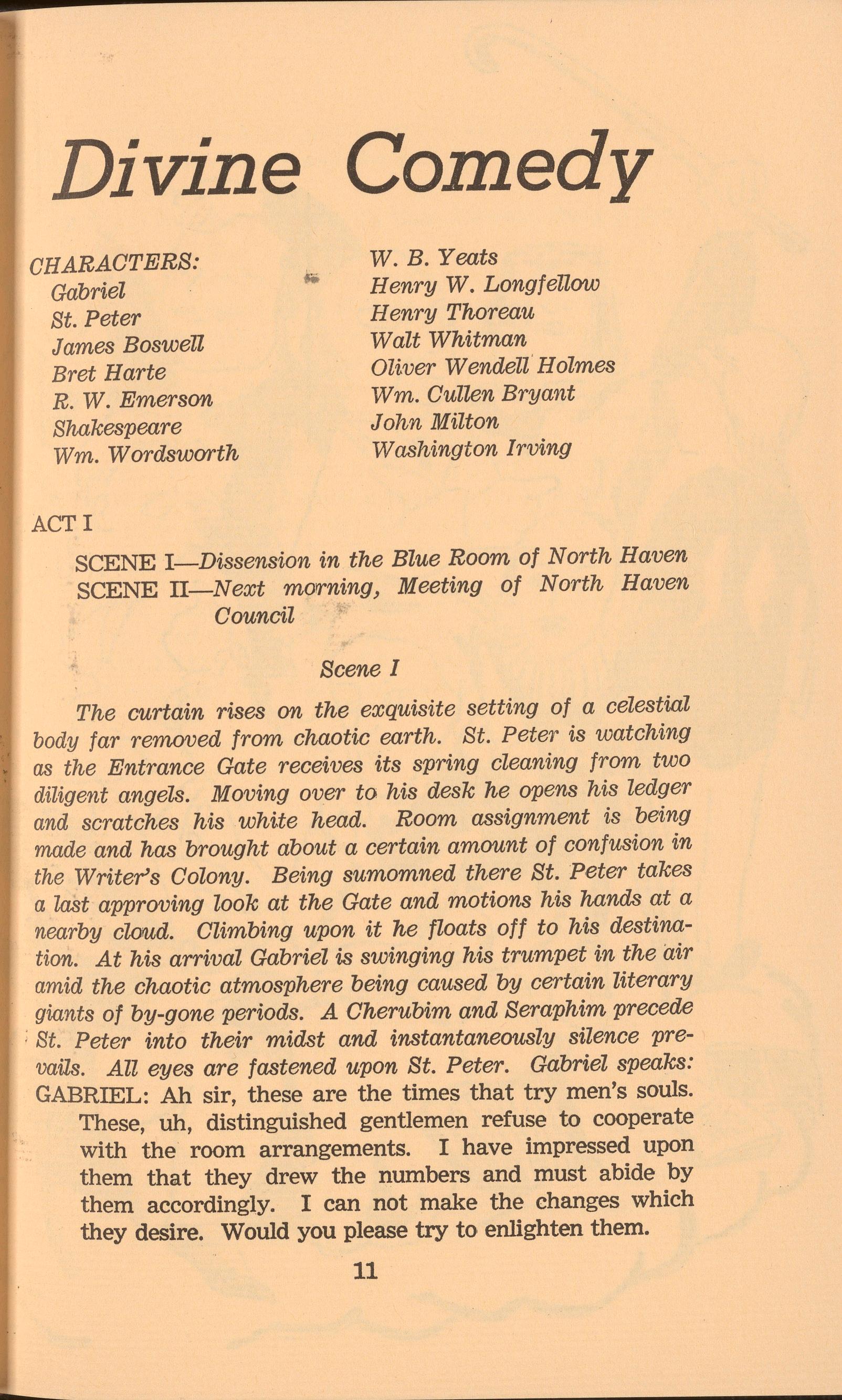
W. B. Yeats
Henry W. Longfellow
Henry Thoreau
Walt Whitman
Oliver Wendell Holmes
Wm. Cullen Bryant
John Milton
Washington Irving
ACT!
SCENE I-Dissension in the Blue Room of North Haven
SCENE II-Next morrning, Meeting of North Haven Council
The curtain rises on the exquisite setting of a celestial body far removed from chaotic earth. St. Peter is watching as the Entrance Gate receives its spring cleaning from two diligent angels. Moving over to his desk he opens his ledger and scratches his white head. Room assignment is being made and has brought about a certain amount of confusion in the Writer's Colony. Being sumomned there St. Peter takes a last approving look at the Gate and motions his hands at a nearby cloud. Climbing upon it he floats off to his destination. At his arrival Gabriel is swinging his trumpet in the air amid the chaotic atmosphere being caused by certain literary giants of by-gone periods. A Cherubim and Seraphim precede : St. Peter into their midst and instantaneously silence prevails. All eyes are fastened upon St. Peter. Gabriel speaks: GABRIEL: Ah sir, these are the times that try men's souls. These, uh, distinguished gentlemen refuse to cooperate with the room arrangements. I have impressed upon them that they drew the numbers and must abide by them accordingly. I can not make the changes which they desire. Would you please try to enlighten them.
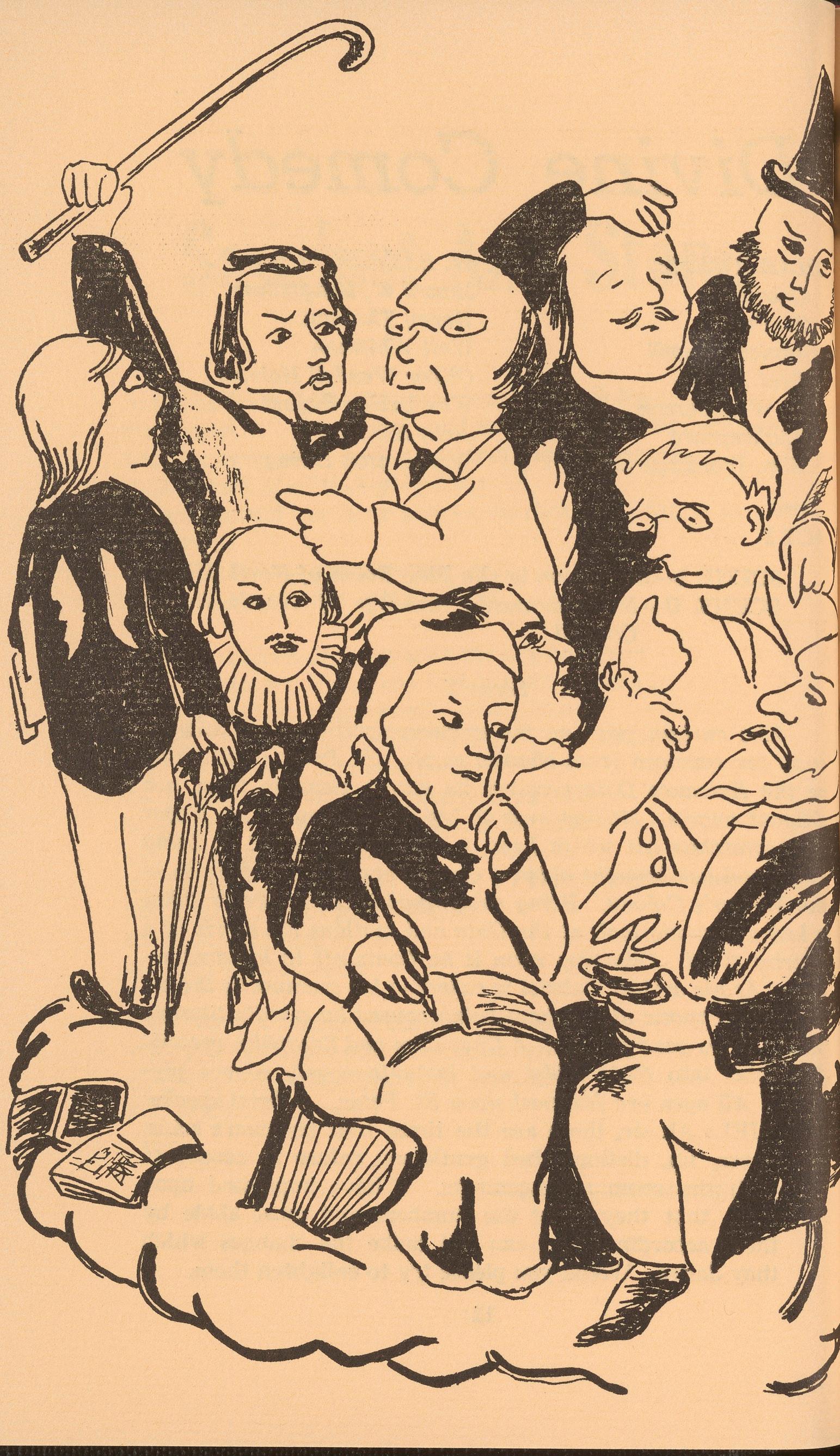
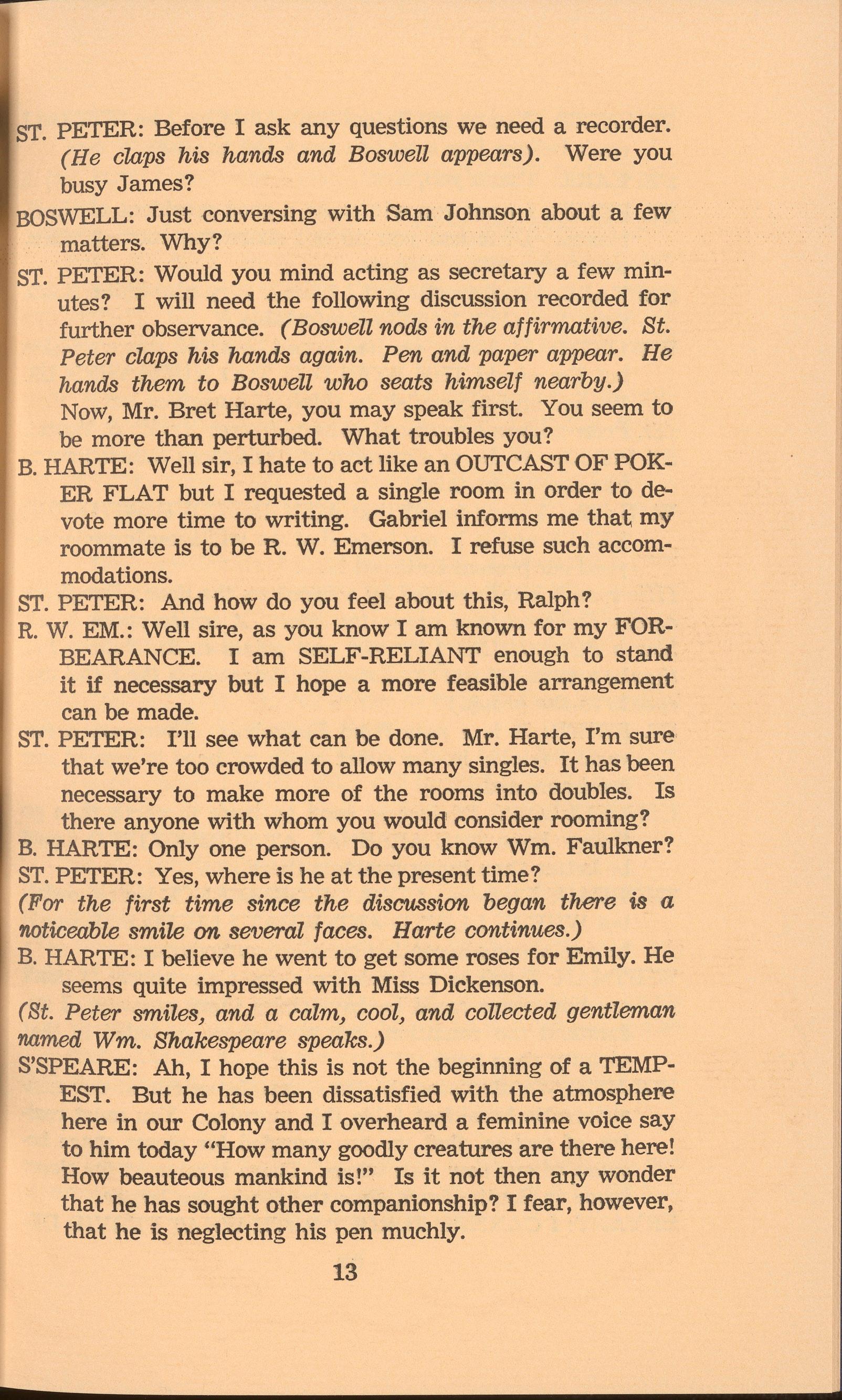
ST. PETER: Before I ask any questions we need a recorder. (He claps his hands and Boswell appears). Were you busy James?
BOSWELL: Just conversing with Sam Johnson about a few matters. Why?
ST. PETER: Would you mind acting as secretary a few minutes? I will need the following discussion recorded for further observance. (Boswell nods in the affirmative. St. Peter claps his hands again. Pen and paper appear. He hands them to Boswell who seats himself nearby.) Now, Mr. Bret Harte, you may speak first. You seem to be more than perturbed. What troubles you?
B. HARTE: Well sir, I hate to act like an OUTCAST OF POKER FLAT but I requested a single room in order to devote more time to writing. Gabriel informs me that my roommate is to be R. W. Emerson. I refuse such accommodations.
ST. PETER: And how do you feel about this, Ralph?
R. W. EM.: Well sire, as you know I am known for my FORBEARANCE. I am SELF-RELIANT enough to stand it if necessary but I hope a more feasible arrangement can be made.
ST. PETER: I'll see what can be done. Mr. Harte, I'm sure that we're too crowded to allow many singles. It has been necessary to make more of the rooms into doubles. Is there anyone with whom you would consider rooming?
B. HARTE: Only one person. Do you know Wm. Faulkner?
ST. PETER: Yes, where is he at the present time?
(For the first time since the discussion began there is a noticeable smile on several faces. Harte continues.)
B. HARTE: I believe he went to get some roses for Emily. He seems quite impressed with Miss Dickenson.
(St. Peter smiles, and a calm, cool, and collected gentleman named Wm. Shakespeare speaks.)
S'SPEARE: Ah, I hope this is not the beginning of a TEMPEST. But he has been dissatisfied with the atmosphere here in our Colony and I overheard a feminine voice say to him today "How many goodly creatures are there here! How beauteous mankind is!" Is it not then any wonder that he has sought other companionship? I fear, however, that he is neglecting his pen muchly.
ST. PETER: Excuse me for not congratulating you, Will, but I don't believe I've seen you since the election.
S'SPEARE: Thank you, sire.
ST. PETER: I trust you will make a good president of North Haven. Doubtless you do not share the room problem with your fellow friends.
S'SPEARE: Wordsworth and I have a very nice suite, thank you. We shall be quite comfortable.
W'WORTH: St. Peter, we had hoped to avoid this confusion but I'm afraid THE WORLD IS TOO MUCH WITH US. We are still too selfish to think of ourselves last.
(St. Peter nods in agreement, then addresses Mr. W. B. Yeats).
ST. PETER: W. B., as a member of Residence Council, how do you feel about this?
W. B.: Sir, I have found that MEN IMPROVE WITH THE YEARS and it is my hope that we will soon improve be• yond our present state but I ....
(His speech is interrupted by a knock on the door. Poe floats across the room and opens the door. A white raven ha~ him a PURLOINED LETTER and points to St. Peter. Poe thanks him and c7,osesthe door. St. Peter reads the letter and speaks to the group.)
ST. PETER: It is a note from Beelzebub. There are a few vacant triples in the court south of here if any of you are interested.
LONGFELLOW: I'd just as soon go back to earth than go there. Even THE ARSENAL AT SPRINGFIELD would be better than living quarters there.
THOREAU: I hope my CIVIL DISOBEDIENCE isn't showing but WHERE I LIVED AND WHAT I LIVED FOR would be against my accepting such accommodations.
WHITMAN: I refuse to triple here, let alone there. I don't see how there could be any triples there anyway. I understand the conditions are even more crowded in that vicinity than here.
HOLMES: We discussed this to a certain extent at our nonautocratic breakfast table this morning. You must real· ize, of course, that we are crowded for closet space because of our new type wings. There is no need for closet space in Squth Court, thus the rooms are larger.
BRYANT: I CANNOT FORGET WITH WHAT FERVID DE·

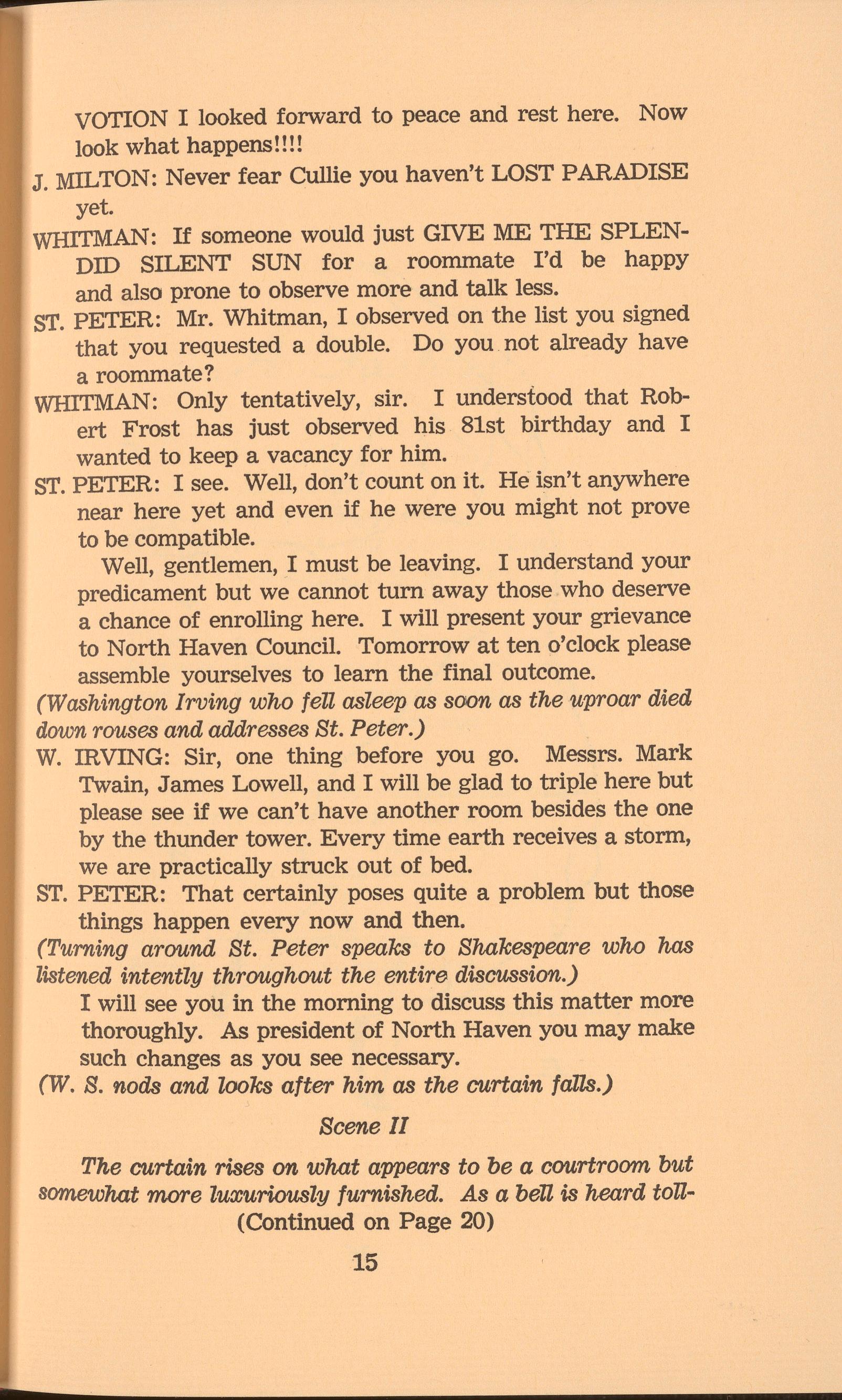
VOTION I looked forward to peace and rest here. Now look what happens!!!!
J. MILTON: Never fear Cullie you haven't LOST PARADISE yet.
WIIlTMAN: If someone would just GIVE ME THE SPLENDID SILENT SUN for a roommate I'd be happy and also prone to observe more and talk less.
ST. PETER: Mr. Whitman, I observed on the list you signed that you requested a double. Do you not already have a roommate?
WIIlTMAN: Only tentatively, sir. I understood that Robert Frost has just observed his 81st birthday and I wanted to keep a vacancy for him.
ST. PETER: I see. Well, don't count on it. He isn't anywhere near here yet and even if he were you might not prove to be compatible.
Well, gentlemen, I must be leaving. I understand your predicament but we cannot turn away those who deserve a chance of enrolling here. I will present your grievance to North Haven Council. Tomorrow at ten o'clock please assemble yourselves to learn the final outcome.
(Washington Irving who fell asleep as soon as the uproar died down rouses and addresses St. Peter.)
W. ffiVING: Sir, one thing before you go. Messrs. Mark Twain, James Lowell, and I will be glad to triple here but please see if we can't have another room besides the one by the thunder tower. Every time earth receives a storm, we are practically struck out of bed.
ST. PETER: That certainly poses quite a problem but those things happen every now and then.
(Turning around St. Peter speaks to Shakespeare who has listened intently throughout the entire discussion.) I will see you in the morning to discuss this matter more thoroughly. As president of North Haven you may make such changes as you see necessary.
(W. 8. nods and looks after him as the curtain falls.)
The curtain rises on what a'P'Pearsto be a courtroom but somewhat more luxuriously furnished. As a bell is heard toll(Continued on Page 20)
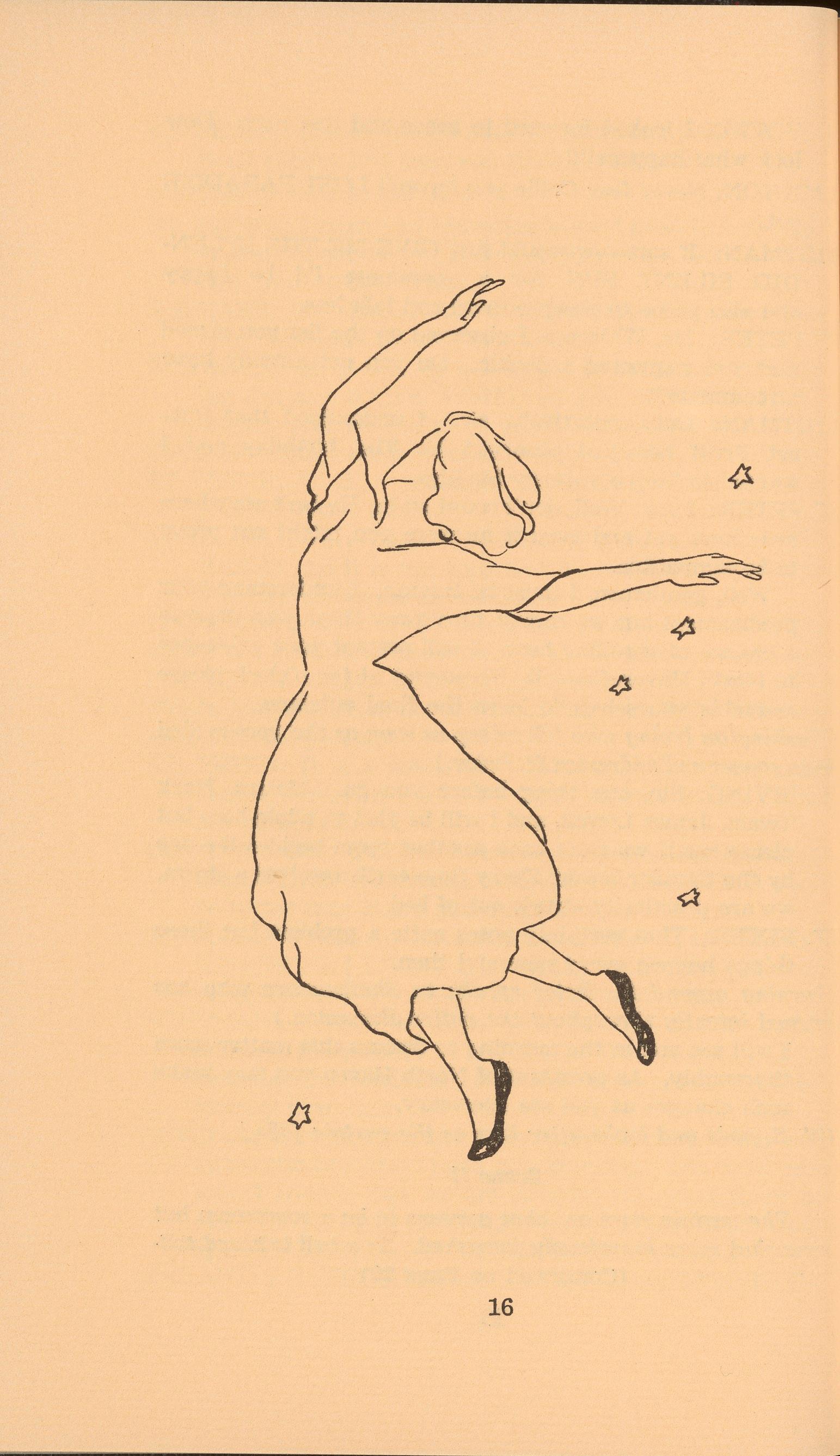

A note of music by Bizet
Disturbed my dreaming as I by One summer night. Entranced, my brain Danced, dizzy from the fluted strain.
Uporn the mind thus subtly caught Strange fantasies are often wrought, And with the piped accompaniment Came sounds of pagan merriment-
A troop of prancing nymphs and satyrs, Mocking prudish pleasure-haters, Romped and hid from tree to tree, Enticing and beguiling me-
And in my fancy then I ran With joy to meet the great god Pan!
-Ann Hunter, '57
By Morey Bernstein, Doubleday and Company, 1956
The Search For Bridey Murphy has created the biggest sensation since the flying saucer craze. Morey Bernstein's hypnotic exploration into the realm of reincarnation has inspired several popular ballads, a round of "come as you were" parties, and a dubious concoction known as "ectoplasm punch." In Oklahoma a 19-year-old newsboy shot and killed himself in order to speed up his next incarnation, and all over the country fascinated readers dashed to amateur hypnotists to discover the facts of their previous existences.
What sort of book is this that has had such an effect on the American public? Contrary to appearances, The Search For Bridey Murphy is not a tongue -in -cheek sensation -seeker. Morey Bernstein writes simply and truthfully of his experi• ments in hypnotic regression with a Pueblo, Colorado, housewife, Ruth Simmons (in real life Virginia Tighe). Bernstein, a Pueblo businessman with a spotless reputation, became in• terested in amateur hypnosis several years ago. After many successful experiences with medical hypnosis, he decided to branch out into a new field-hypnotic regression. Finding a particularly good subject in Ruth Simmons, .he again had sue• cessful results. Finally he discovered that he was able to take Ruth back not only to her very early childhood, but ac• tually "over the hump" into a seemingly previous life.
"What did you see?" inquired the author.
" ... scratched the paint off all my bed," answered the hypnotized Ruth, who now talked like a little girl with an Irish brogue. When Bernstein asked her name, the answer came back:
"Friday .•. Friday Murphy." (This was a misunderstanding on the part of the author. Ruth later explained to -18
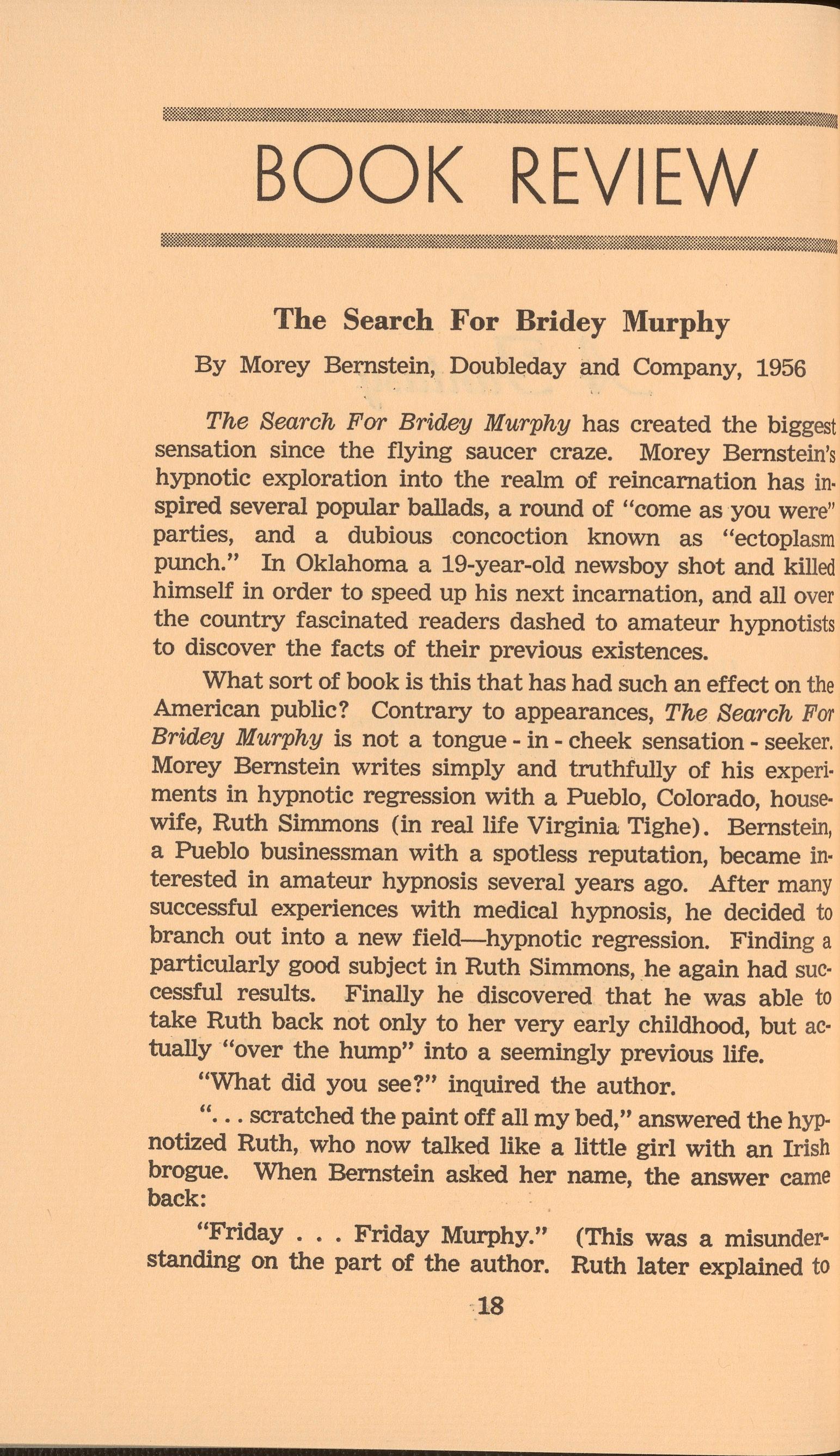

him, still under hypnosis, that her name was not Friday, but Bridey, a shortened form of Bridget.)
This was only the beginning. Bridey soon revealed that she was born in 1798, the daughter of a Cork barrister, that she married Brian McCarthy, and moved to Dublin, where she died in 1864. She also supplied a wealth of detail about her life in Ireland, giving the names of streets, churches, and business firms in Cork and Dublin, correctly naming the currency of the period, and using several unfamiliar but authentic expressions of the 19th century. Bridey also told about her own death and what happened afterward. Unfortunately the book was scheduled to be printed before many of these facts could be investigated. Since publication, howeevr, researchers have traced most of Bridey's statements and found some to be groundless and some to be unaccountably accurate.
There is more to The Search For Bridey Murphy than the actual experiments with Ruth Simmons. The first six chapters of the book deal with Bernstein's other work in hypnosis-he has on occassion colloborated with Dr. Joseph B. Rhine of Duke University, America's foremost authority on extra-sensory perception-and with a variety of related subjects: clairvoyance, telepathy, and the "life readings" of the late Edgar Cayce. These, in addition to the story of Bridey, create a fascinating book-one that may not inspire a belief in reincarnation but will certainly reveal that man is far from solving the mysteries of the human mind.
-Ann Hunter, '57
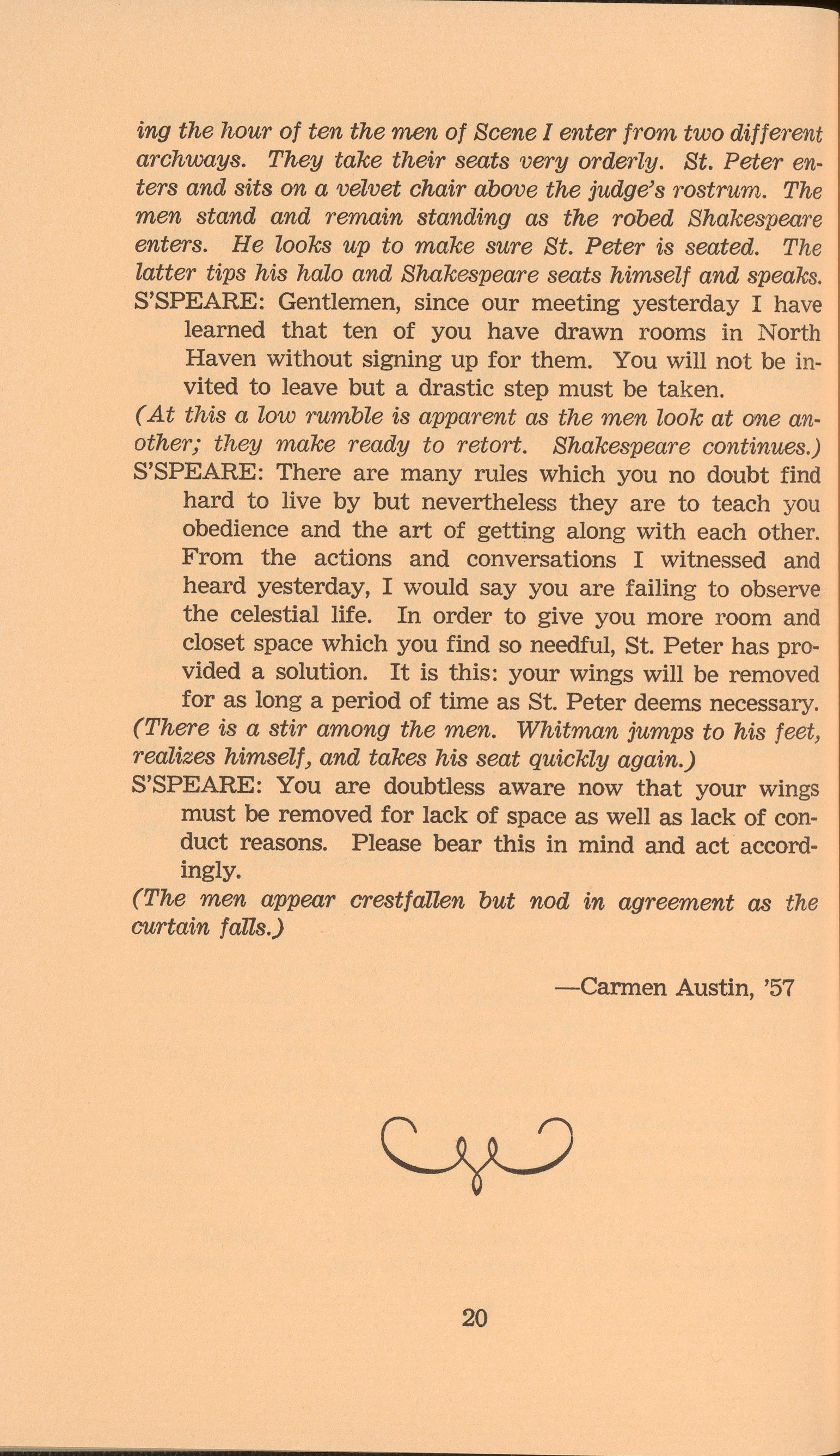
ing the lwur of ten the m,en of Scene I enter from two different archways. They take their seats very orderly. St. Peter enters and sits on a velvet chair above the judge's rostrum. The men stand and remain standing as the robed Shakespeare enters. He looks up to make sure St. Peter is seated. Th e latter tips his halo and Shakespeare seats himself and speaks.
S'SPEARE: Gentlemen, since our meeting yesterday I ha ve learned that ten of you have drawn rooms in North Haven without signing up for them. You will not be invited to leave but a drastic step must be taken.
( At this a low rumble is apparent as the men look at one another; they make ready to retort. Shakespeare continues .)
S'SPEARE: There are many rules which you no doubt find hard to live by but nevertheless they are to teach y ou obedience and the art of getting along with each other. From the actions and conversations I witnessed and heard yesterday, I would say you are failing to observe the celestial life. In order to give you more room and closet space which you find so needful, St. Peter has provided a solution. It is this: your wings will be removed for as long a period of time as St. Peter deems necessary. (There is a stir among the men. Whitman jumps to his feet, realizes himself, and takes his seat quickly again.)
S'SPEARE: You are doubtless aware now that your wings must be removed for lack of space as well as lack of conduct reasons. Please bear this in mind and act accordingly.
(The men appear crestfallen but nod in agreement as th e curtain falls.)
-Carmen Austin, '57
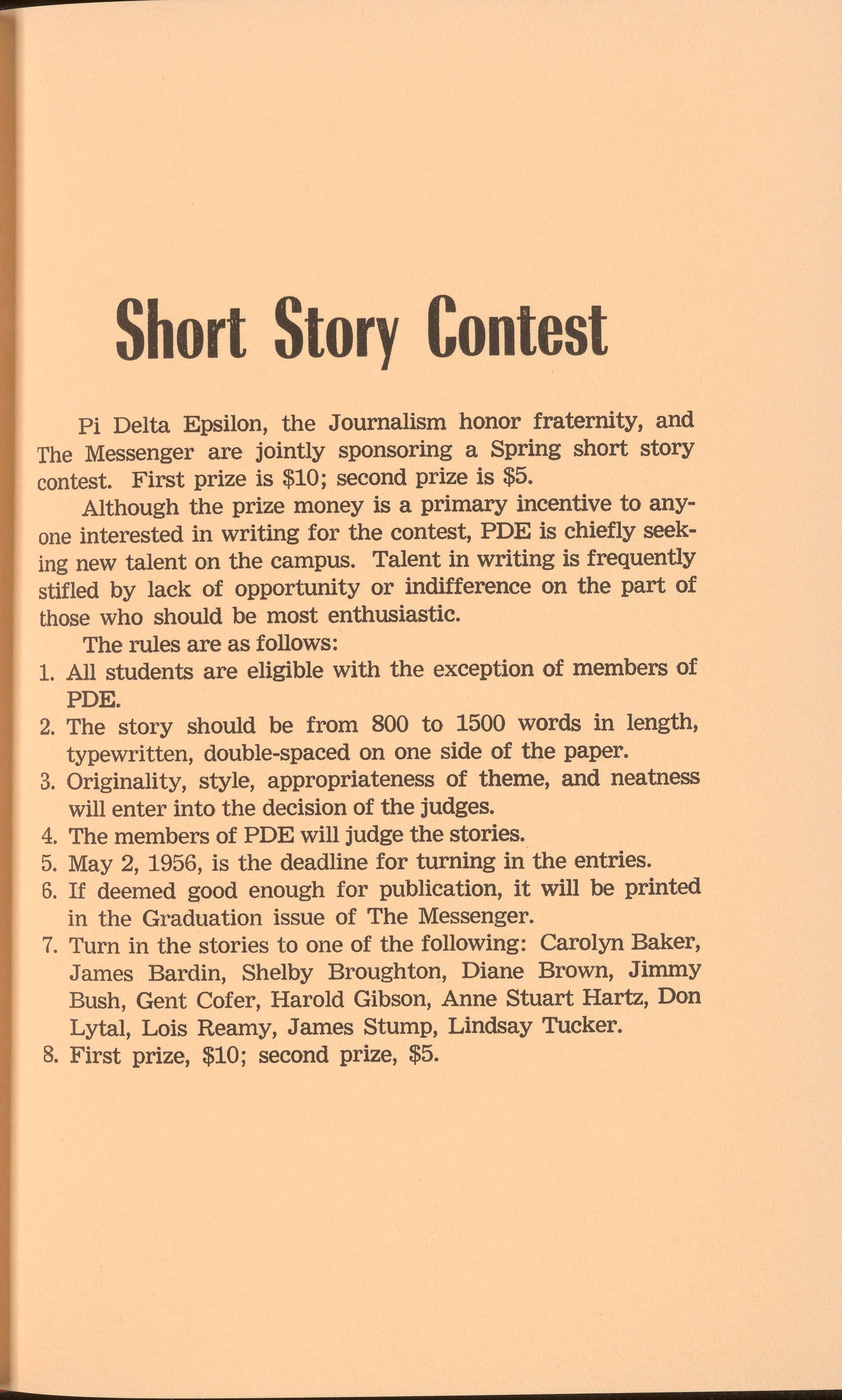
Pi Delta Epsilon, the Journalism honor fraternity, and The Messenger are jointly sponsoring a Spring short story contest. First prize is $10; second prize is $5.
Although the prize money is a primary incentive to anyone interested in writing for the contest, PDE is chiefly seeking new talent on the campus. Talent in writing is frequently stifled by lack of opportunity or indifference on the part of those who should be most enthusiastic.
The rules are as follows:
1. All students are eligible with the exception of members of PDE.
2. The story should be from 800 to 1500 words in length, typewritten, double-spaced on one side of the paper.
3. Originality, style, appropriateness of theme, and neatness will enter into the decision of the judges.
4 The members of PDE will judge the stories.
5. May 2, 1956, is the deadline for turning in the entries.
6. If deemed good enough for publication, it will be printed in the Graduation issue of The Messenger.
7. Turn in the stories to one of the following: Carolyn Baker, James Bardin, Shelby Broughton, Diane Brown, Jimmy Bush, Gent Cofer, Harold Gibson, Anne Stuart Hartz, Don Lytal, Lois Reamy, James Stump, Lindsay Tucker.
8. First prize, $10; second prize, $5.
